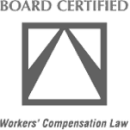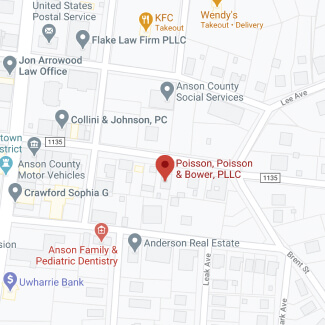- Contact Us
for Help Today
-
RELATED INFORMATION
-
View all testimonials
“I injured my back in the early part of 2011 while at work. After trying to deal with workman’s comp by myself, I finally decided it was too much of a hassle so I decided to look for an attorney. I went to Poisson, Poisson & Bower, PLLC and spoke to Mr. Fred Poisson who immediately understood everything I was going through. I decided to give him a try and my life got a little easier to deal with. No more complicated paperwork or phone calls from workman’s comp, it all went through the attorney’s office. They made sure that everything was handled for me. They handled my case very well and were very consistent on keeping me updated. Thank you Poisson, Poisson & Bower, PLLC for helping me get my life back in order.”
─ J.W., Wadesboro, N.C.
“I was hurt as a result of a catastrophic industrial accident. We were looking for a lawyer to represent us and found one after talking to a very close friend of ours. Our friend had met Stewart Poisson before and thought she would be a good fit for us. I was in a drug-induced coma for three months, and Stewart made this terrible situation much more tolerable for my wife. She even traveled to UNC Health Care in Chapel Hill to make sure that I was getting the care that I needed. She did address some issues that needed to be changed. One such issue was finding a different doctor, a doctor that was familiar with my type of injury. Switching doctors turned out to be instrumental in my recovery. My wife and I have a lot of confidence in Stewart and would definitely recommend her to anyone requiring a great lawyer. She is very competent and friendly.”
─ A.S., Wilmington, NC
-
Meet Our AttorneysLearn more about the firm

Workplace injuries affect millions of people every year across the United States, including thousands of workers in North Carolina. In just one recent year, the Bureau of Labor Statistics reported more than 80,000 workers in North Carolina suffered a nonfatal workplace injury or illness across the public and private sectors.
If you’ve been hurt on the job in North Carolina, contact Poisson, Poisson & Bower, PLLC, immediately. For more than 40 years, our North Carolina workers’ compensation attorneys have helped injured workers just like you seek the benefits they are entitled to. We have a strong track record of positive results for our clients and will work tirelessly to help you through the workers’ compensation claims process.
For more information, contact our office today.
Importance of Safety in the Workplace
Employers should take workplace safety seriously, even if it seems like there are few dangers to employees in your workplace. While certain jobs are more dangerous than others, many workers are injured in seemingly safe, ordinary work environments.
Common Types of Workplace Injuries in North Carolina
There are many different types of workplace injury cases we handle at our firm. Some of the most common workplace injuries we see in North Carolina include:
- Overexertion — Workers who push their bodies too hard or don’t use proper techniques when working with heavy objects can put themselves under a lot of physical strain, leading to muscle tears, sprains, and other injuries. Overexertion injuries are prevalent among workers who spend a lot of time lifting or carrying large objects.
- Falls — Falls can cause severe injuries at work, including spinal cord damage and traumatic brain injuries (TBI). Some falls are caused by workers slipping or tripping on loose objects or slippery floors. Others can be caused by worn or defective railings, staircases, escalators, or scaffolding.
- Being struck by an object — While workers falling from a significant height can cause severe injuries, the same is often true when falling objects strike workers. Many of these injuries are caused by other workers who are careless and drop or lose some object or tool. Falling-object injuries can also happen if a shelf or other structure collapses while holding heavy objects.
- Mental injuries — Physical injuries aren’t the only danger workers face on the job. People in demanding positions (police, firefighters, doctors, nurses, and paramedics, for example) may experience severe stress that can take a toll over time. Workers can also sometimes develop mental health disorders if they suffer or witness a traumatic event on the job, such as a car accident, explosion, workplace violence, etc.
- Bodily reaction — Depending on what kind of work you do, you might be exposed to toxic or potentially dangerous substances fairly frequently. These hazardous substances can cause chemical burns if they contact the skin or are inhaled or ingested. In some cases, just being near certain substances can cause allergic reactions or other illnesses for certain workers, especially if they’re not wearing proper protective gear.
- Motor-vehicle accidents — Many jobs involve workers having to drive as part of their duties, which increases their odds of being involved in a work-related crash. Severe car or truck crashes can lead to broken bones, internal organ damage, spinal cord injuries, burns, TBIs, and other serious conditions.
- Getting caught in or compressed by something — Workers caught in or compressed by heavy industrial machinery can suffer horrific injuries, including crushed, amputated, or severed limbs.
- Repetitive motion — In many cases, workplace injuries don’t result from a single accident but rather gradual wear and tear on the body. These injuries are frequently caused by a worker repeating the same motion many times a day.
- Striking an object — Workers can suffer severe injuries if they’re pushed into an object by a co-worker or if the worker isn’t paying attention to what they’re doing and collides with the object.
- Violence — A fight at work can easily lead to severe injuries for anyone involved, especially if one or more parties use a weapon during the fight.
Who’s Responsible for Your Work Injury?
In most cases, workplace injuries fall under North Carolina’s no-fault workers’ compensation system. As long as your injury occurred while performing work-related tasks and you weren’t drunk, high, or doing anything illegal, workers’ compensation should cover your medical treatment and other benefits regardless of who is to blame for your injury.
However, there are a few exceptions to this rule. If you were injured on the job by someone who doesn’t work for your company, you might have a case for a third-party personal injury claim. Alternatively, if you were injured outside of the scope of your work duties, workers’ compensation would not apply.
What To Do After a Workplace Injury in North Carolina
Here are the key steps to take if you sustain a workplace injury in North Carolina:
- Seek medical treatment as soon as possible. Your health is your primary concern. Waiting too long to see a doctor could jeopardize your health and your claim for workers’ compensation benefits.
- Report the injury right away. If you’re too badly injured to do so yourself, have a friend, family member, or colleague make the report on your behalf. Make the report in writing so there’s a record you can refer to.
- Document the accident scene as best you can. Take pictures of the spot where the accident occurred, the general area around the accident site, and any injuries you suffered.
- Hold on to your medical records and any other supporting evidence you have.
- Talk to a North Carolina workplace injury lawyer.
Do You Need to Hire a Workers’ Comp Attorney After a Job Injury?
There’s no legal requirement for you to hire a lawyer to help with your workers’ compensation claim. However, we strongly recommend getting help from an attorney. Workers’ compensation claims can be quite complicated. Hiring a lawyer means you’ll have a much better chance of getting the benefits you need after a significant injury.
Contact an NC Workers’ Comp Lawyer Today
If you’ve been injured on the job, speaking to an experienced North Carolina workers’ comp lawyer is in your best interest. To learn more, contact Poisson, Poisson & Bower, PLLC, today for a free initial consultation.













